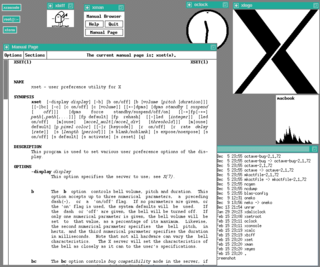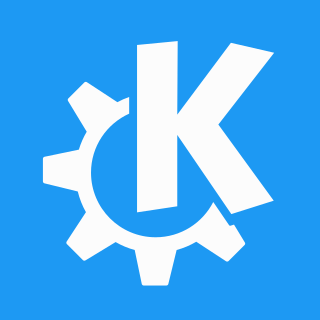
KDE is an international free software community developing Free and Open Source software. As a central development hub, it provides tools and resources that allow collaborative work on this kind of software. Well-known products include the Plasma Desktop, KDE Frameworks and a range of cross-platform applications like Krita or digikam designed to run on Unix and Unix-like desktops, Microsoft Windows and Android.

Mandriva Linux was a Linux distribution by Mandriva. It used urpmi.
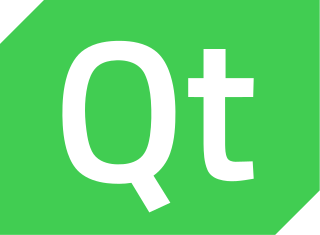
Qt is a free and open-source widget toolkit for creating graphical user interfaces as well as cross-platform applications that run on various software and hardware platforms such as Linux, Windows, macOS, Android or embedded systems with little or no change in the underlying codebase while still being a native application with native capabilities and speed. Qt is currently being developed by The Qt Company, a publicly listed company, and the Qt Project under open-source governance, involving individual developers and organizations working to advance Qt. Qt is available under both commercial licenses and open source GPL 2.0, GPL 3.0, and LGPL 3.0 licenses.
In computing, a desktop environment (DE) is an implementation of the desktop metaphor made of a bundle of programs running on top of a computer operating system, which share a common graphical user interface (GUI), sometimes described as a graphical shell. The desktop environment was seen mostly on personal computers until the rise of mobile computing. Desktop GUIs help the user to easily access and edit files, while they usually do not provide access to all of the features found in the underlying operating system. Instead, the traditional command-line interface (CLI) is still used when full control over the operating system is required.
freedesktop.org (fd.o) is a project to work on interoperability and shared base technology for free software desktop environments for the X Window System (X11) on Linux and other Unix-like operating systems. It was founded by Havoc Pennington from Red Hat in March 2000. The project's servers are hosted by Portland State University, which in turn are sponsored by HP, Intel and Google.
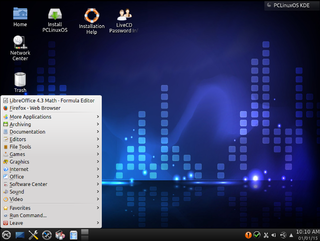
PCLinuxOS, often shortened to PCLOS, is an x86-64 Linux distribution, with KDE Plasma Desktop and MATE as its default user interfaces. It is a primarily free software operating system for personal computers aimed at ease of use. It is considered a rolling release.

Free and Open source Software Developers' European Meeting (FOSDEM) is a non-commercial, volunteer-organized European event centered on free and open-source software development. It is aimed at developers and anyone interested in the free and open-source software movement. It aims to enable developers to meet and to promote the awareness and use of free and open-source software.

ALT Linux is a set of Russian RPM-based operating systems built on top of the Linux kernel and Sisyphus packages repository. ALT Linux has been developed collectively by ALT Linux Team developers community and ALT Linux Ltd.

Kubuntu is an official flavour of the Ubuntu operating system which uses the KDE Plasma Desktop instead of the GNOME desktop environment. As part of the Ubuntu project, Kubuntu uses the same underlying systems. Every package in Kubuntu shares the same repositories as Ubuntu, and it is released regularly on the same schedule as Ubuntu.

KDE Software Compilation 4 was the only series of the so-called KDE Software Compilation, first released in January 2008 and the last release being 4.14.3 released in November 2014. It was the follow-up to K Desktop Environment 3. Following KDE SC 4, the compilation was broken up into basic framework libraries, desktop environment and applications, which are termed KDE Frameworks 5, KDE Plasma 5 and KDE Applications, respectively.

KDE Plasma 4 is the fourth-generation of the KDE workspace environments. It consists of three workspaces, each targeting a certain platform: Plasma Desktop for traditional desktop PCs and notebooks, Plasma Netbook for netbooks, and Plasma Active for tablet PCs and similar devices.
A desktop environment is a collection of software designed to give functionality and a certain look and feel to an operating system.
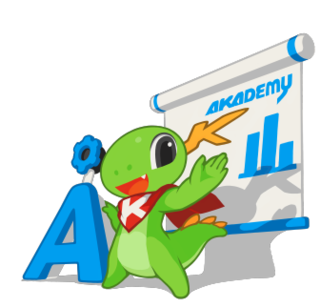
Akademy is an annual contributors and users conference of the KDE community. Akademy is held at varying venues in Europe.

K Desktop Environment 1 was the inaugural series of releases of the K Desktop Environment. There were two major releases in this series.

Frank Karlitschek is a German open source software developer living in Stuttgart, Germany.
Blue Systems is a German IT company. It is most prominent as a major KDE supporter and previous driving force behind Kubuntu with a number of KDE developers working for Blue Systems. According to Blue Systems employee Aurélien Gâteau, "Blue Systems does not have a business model, at least for now".

KDE Plasma 5 is the fifth and current generation of the graphical workspaces environment created by KDE primarily for Linux systems. KDE Plasma 5 is the successor of KDE Plasma 4 and was first released on 15 July 2014. It includes a new default theme, known as "Breeze", as well as increased convergence across different devices. The graphical interface was fully migrated to QML, which uses OpenGL for hardware acceleration, which resulted in better performance and reduced power consumption.

Flatpak is a software utility for software deployment, package management, and application virtualization for Linux desktop computers. It provides a sandbox environment in which users can run applications in isolation from the rest of the system. Applications using Flatpak need permission from the user to control hardware devices or access the user's files.

KDE neon is a set of software repositories for Ubuntu long-term support (LTS) releases with latest 64-bit version of KDE desktop and applications. It is also the name given to a Ubuntu LTS-based Linux distribution that utilizes said repositories. It aims to provide the users with rapidly updated Qt and KDE software, while updating the rest of the OS components from the Ubuntu repositories at the normal pace. It comes in user and developer editions.
